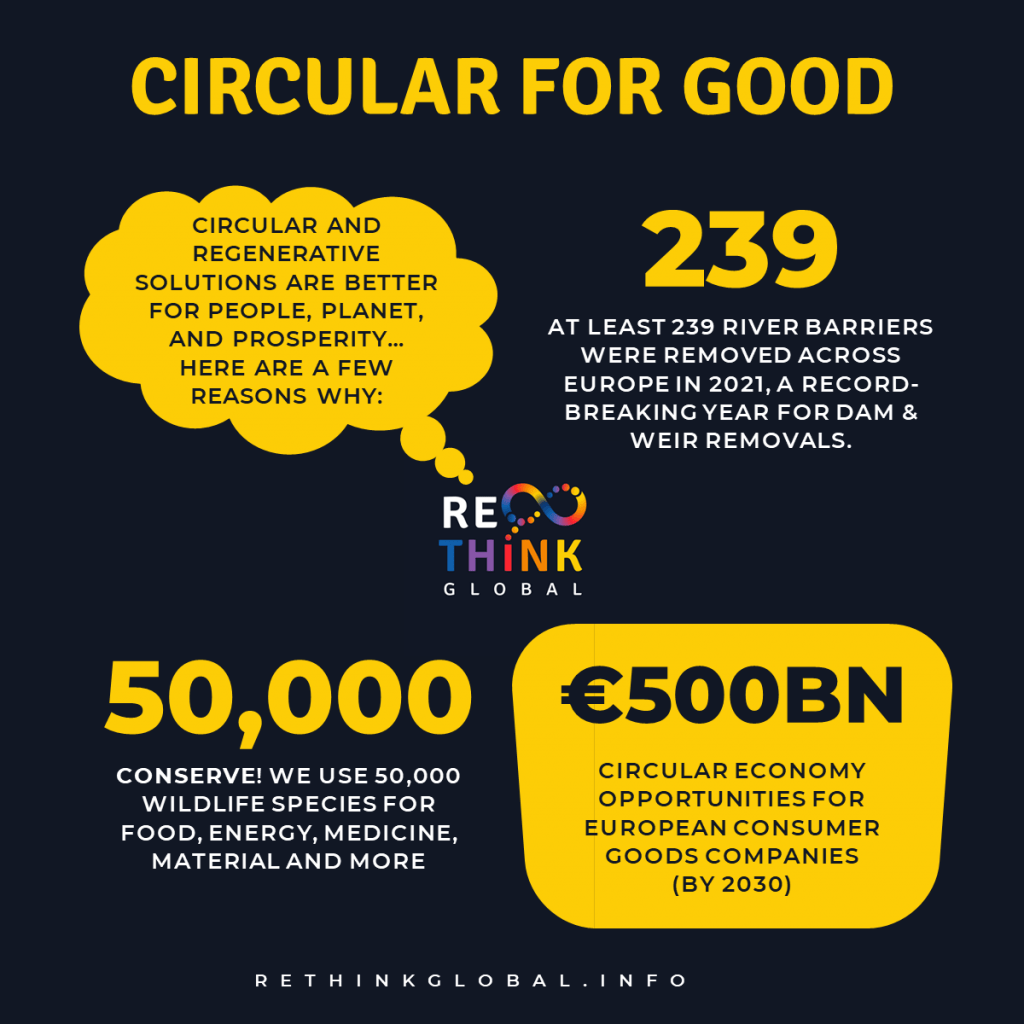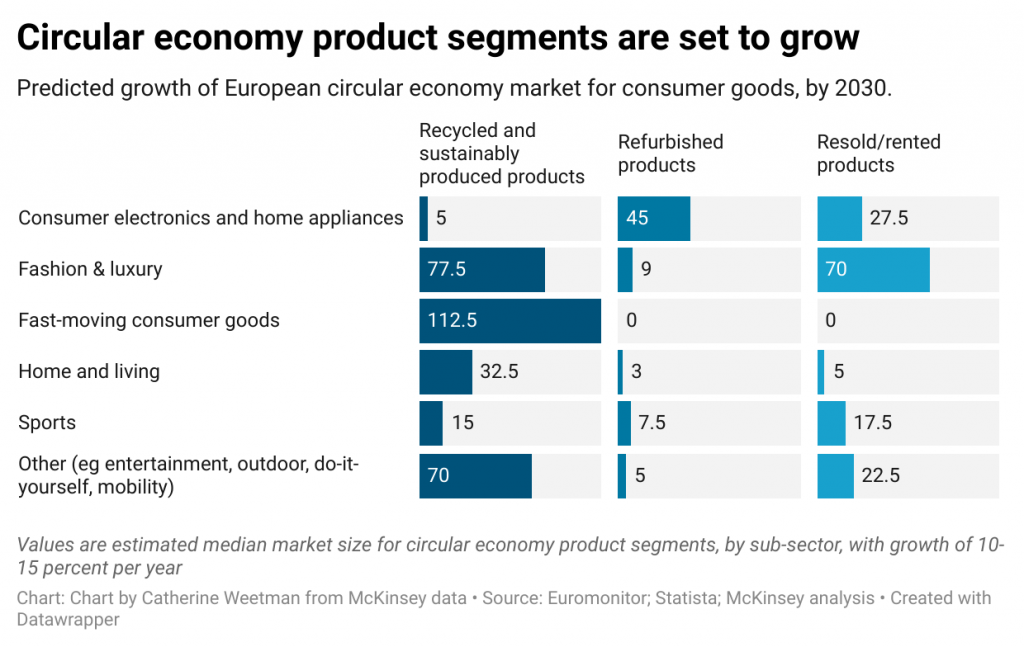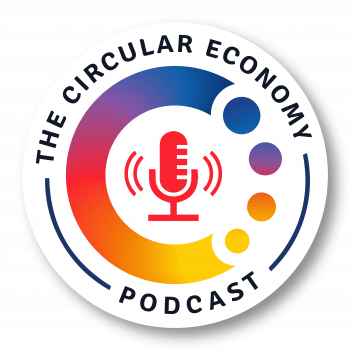
Sprinting towards the light
Turn eco-anxiety into positive action | Flip disagreements into discoveries | Transform business risks into a €500bn circular economy opportunity | Circular Economy Podcasts | Circular Innovations | Thank you letters
Can I really make a difference? You bet!
It’s been a long time since the last issue – and even now, I’m wondering if this is another form of ‘productive procrastination’ (to avoid the focus and writing actions needed for the book).
I’m guessing many of you – like me – are feeling pretty stuck, and worried about the state of our world on lots of different levels. The good news is that there’s a recognised term for what we’re feeling – eco-anxiety. And the better news is that we can do something about it… (and no, sorry, but it doesn’t include distracting ourselves with yet more entertainment, social media or other forms of avoidance). Read on to find out how…
*Thanks to The Guardian for sharing Christiana Figueres calling for us to “sprint towards the light” in this article on the science around extreme weather and global heating.
In this issue:
- Turn eco-anxiety into positive action
- Flip disagreements into discoveries
- Transform business risks into a €500bn circular economy opportunity
- Circular Economy Podcasts – did you miss some?
- Circular innovations
- Thank you letters
(Links for the data in the Circular for Good infographic are at the bottom of this newsletter)
Turn eco-anxiety into positive action
In business and in our own lives, many of us want to make a difference on climate change and biodiversity. Often though, doubts creep in and people want to know, “Can I really make a difference?”
Writing in The Conversation, Earth System scientist Michael Mann and organisational behavioural psychologist Thomas Manning explain that at the heart of that question is what’s known as agency. In a nutshell, they say, it means being able to do what you set out to do, and believing you can succeed. It’s becoming ever clearer that we humans – especially those of us in developed economies – are changing the climate and undermining the living systems we depend on. Yet, our actions can also improve the health of our planet, we can reduce fossil fuel use and shrink the footprint of production and consumption.
We still have time to avoid the worst effects of climate change. But time is running out. Bateman and Mann believe that people are alarmingly short of psychological agency: the belief in our personal ability to help make a difference. A key part of this is believing “I can do this” when we’re facing tasks, making plans or changing habits to boost our sense of agency, especially for something as daunting as climate change. We should focus first on the facts, getting clearer on what’s causing the harm and how we can help.
They explain that successful agency has four psychological drivers: intentionality forethought, self-regulation and self-reflection. With practice, we can strengthen all of these. To make a bigger impact, we can use our personal agency as a route to group efforts: “collective agency”. The full article published in The Conversation is worth a read…
Flip disagreements into discoveries
Maybe you’re struggling to convince others to prioritise positive action on climate, nature and collective well being? Organisational psychologist Adam Grant, best-selling author of Think Again, believes a good debate is about both people making a discovery, rather than one person declaring victory. In this article in The Guardian, he says that too many of us think like preachers, prosecutors and politicians. “In preacher mode, you’re trying to proselytise your views. In prosecutor mode, you’re attacking someone else’s. And in politician mode, you don’t even listen to people unless they already share your views.”
But, he warns, “whether you’re preaching, prosecuting or politicking, you’ve already concluded that you’re right and they are wrong. You flipped a switch that shuts down your capacity for critical thinking.”
Read the full article to discover how to improve the quality of your debates, turn disagreements into discoveries, and use arguments to build relationships instead of causing conflict.
Transform business risks into a €500bn circular economy opportunity
A recent report from McKinsey urges consumer goods companies to ‘play offense’ on circularity, to see extending the lives of their products as “an opportunity for growth, rather than a threat.”
Quoting figures from the Ellen MacArthur Foundation, McKinsey points out that every year, the fast-moving consumer goods (FMCG)sector discards material worth €2.4 trillion: 80 per cent of the material value. Pointing out that across product lifecycles, productive activity causes the vast majority of Greenhouse Gas emissions (80 per cent of the total in fashion and consumer electronics), McKinsey highlights the benefits of “drastically slow[ing] productive activity.” Switching to more efficient, cleaner energy sources makes a big contribution to emissions reduction, but a big proportion of the reductions depend on other approaches – and this is where circular strategies come in. McKinsey lists circular strategies for the fashion industry that could contribute over 650 million metric tons of emissions abatement by 2030, with similar equations applicable across other consumer goods sectors.
It sees four key loops supported extended product life: repair, resale/rental, refurbishment and recycling, and notes that governments are ‘pushing hard’, through initiatives like the European Green Deal and Circular Economy Action Plan (CEAP), and extended producer responsibility regulations being rolled out by several European countries.

McKinsey provides estimates for each sub-sector, reflecting the proportion of circular goods in Europe increasing from 10 per cent today to between 25 and 35 per cent by 2030, equating to €400 billion to €650 billion annually. I’ve used the McKinsey data to show the median value for each circular approach, by sub-sector.
However, it’s curious that McKinsey doesn’t show opportunities for increased sales of more durable and repairable products – the experience of outdoor clothing company Patagonia shows that going all-in on quality, functionality and durability (backed by repair services and a lifetime warranty) can significantly increase market share and gain ‘super fans’ as customers. Patagonia has done this with virtually no marketing.
Catch up on the Circular Economy Podcast

The long list of episodes below are the giveaway for how long it’s been since we published a newsletter… and we’ve got a lovely (IMO) new logo!
Have you missed something that could help inspire you or your team? Have a look, and visit the podcast page (or our interactive index page) to see the shownotes and a player – or find us on your favourite podcast app.
We’re also celebrating breaking into the top 5% of ALL podcasts globally – if you have a few spare minutes, please give us a rating in your podcast app to help others find the Circular Economy Podcast.
- 69 Jo Godden of RubyMoon – circular fibres for activewear – Jo Godden of RubyMoon tells us about two groundbreaking circular research projects to help recover and recycle swimwear textiles
- 70 Customer Pain Points – Solving customer problems is at the heart of a successful product or service – but what if you’ve misunderstood your customer’s pain points?
- 71 Rob Thompson – scaling up circular marine plastic solutions – Rob Thompson tells us how Odyssey Innovations’ brilliant circular model for marine plastics is expanding further afield
- 72 Gavin Fernie-Jones is repurposing outdoor gear, One Tree at a Time – Gavin Fernie-Jones founded One Tree at a Time, a circular social enterprise to repurpose outdoor gear and ski-wear, sharing value with the community and nature
- 73 Tom Szaky – the convenience of prefill – Tom Szaky, founder of TerraCycle, tells us how big brands use the Loop reusable packaging platform to bring the convenience of prefill to high streets everywhere
- 74 Charles Ross on Outdoor Clothing – Charles Ross is a specialist in Performance Sportswear Design & sustainable matters, focusing on issues like forever chemicals, plastics-in-the-ocean and bioplastics
- 75 Helena Norberg-Hodge – the future is local – Helena Norberg-Hodge is a pioneer of the new economy movement, revitalizing cultural and biological diversity and strengthening local communities and economies, worldwide.
- 76 Isolde de Ridder – Circular Jeweller – Isolde de Ridder creates high-end jewellery with the greatest care for both people and planet, saving precious memories and giving discarded metals a second life
- 77 Steve Haskew – The world’s first Kitemark for Remanufactured Laptops – Steve Haskew returns to tell us how Circular Computing was awarded the world’s first BSI Kitemark for Remanufactured Laptops from the British Standards Institute
- 78 Colin Church – complex challenges for materials – Colin Church of the Institute of Materials, Minerals & Mining (IOM3) guides us through a few of the complex challenges related to materials from sand to lithium
- 79 Jordi Ferre – creating value from wine waste Jordi Ferre is leading the expansion of Alvinesa’s circular economy plant-based ingredients – from wine waste – into the global food and nutrition markets
- 80 Evolving and scaling Successful businesses keep on evolving – how do circular businesses evolve, and make a bigger positive impact? Catherine picks out themes from the last series
- 81 René Bethmann – circular designs for outdoor sports gear – René Bethmann is leading new approaches to the design of emotionally durable and circular products and textiles for outdoor apparel and gear at Vaude Sports
- 82 Maria Westerbos – Plastic Soup Foundation – Maria Westerbos founded the Plastic Soup Foundation to raise awareness about the health risks from plastic in everyday products, and how we can switch away from it
- 83 Kim Baker – funding equitable, market-driven circular solutions – Kim Baker tells us how Elemental funds equitable, market-driven circular economy and climate-tech solutions to uplift people and communities around the world
- 84 Jo Chidley – ReRe – reusable packaging – Jo Chidley is co-founder of ReRe, a buy anywhere, return anywhere, reuse anywhere alternative to single-use packaging for a wide range of consumer products.
- 85 India Hamilton – SCOOP – transforming local food systems – India Hamilton, cofounder of circular economy food cooperative SCOOP explains the challenges of providing healthy, affordable and local food on a small island
- BONUS – India Hamilton – SCOOP – part 2 – India Hamilton shares more about circular economy food co-operative SCOOP, Permaculture, membership models, and why she loves compliance officers
Find the podcast series on iTunes, Google Podcasts, PlayerFM, Spotify, TuneIn, or search for “circular economy” in your favourite podcast app.
Don’t forget, you can use our interactive, searchable podcast index to find episodes by sector, by region or by circular strategy. Plus, there is now a regular Circular Economy Podcast newsletter, so you get the latest episode show notes, links and transcript delivered to your inbox on Sunday morning, each fortnight. The newsletter includes a link to the episode page on our website, with an audio player. You can subscribe by clicking this link to update your preferences
PS We’d love it if you could post a review, and help other people find us!
Circular innovations
Thanks to my husband for spotting an article about Kano.Tech, a new consumer technology brand focused on modular and upgradable designs, with some DIY features. Looks like not all the products are available yet, but the range is interesting, including a PC, headphones, mouse, webcam and more.
Kano says “the good future needs…
Devices with nothing to hide, that you get to know from the inside out.
Objects that begin and end as modules which can be upgraded, repaired, customised.
Devices that age beautifully and evolve with you, and make creating as easy as consuming.”
I couldn’t find much on the web about Kano, though there’s an interesting piece on the Microsoft website, here.
Thank you letters
Thanks to Manda Scott for inviting me to be one of the speakers on the new Thrutopia Masterclass, for writers & aspiring writers in all media, “writing our way to a future we’d be proud to leave to the coming generations”. In contrast to stories of dystopias and utopias, Manda Scott says, “We need to write Thrutopias: clear, engaging routes through to a world we’d all be proud to bequeath to future generations.”
My talk is this Sunday, and I’ll be trying a couple of new angles that I’m excited about (and will feature in the next book). Find out more on the Thrutopia website.
Links for the data in the Circular for Good infographic
- 239 dams removed from European rivers https://www.theguardian.com/environment/2022/may/16/record-number-of-dams-removed-from-europe-rivers-in-2021-aoe
- 50,000 wild species used by humans https://phys.org/news/2022-07-billions-people-wild-species-food.html
- €500bn circular economy opportunity for European consumer goods companies https://www.mckinsey.com/industries/consumer-packaged-goods/our-insights/playing-offense-on-circularity-can-net-european-consumer-goods-companies-500-billion-euros
We’re happy to help with your circular projects – just hit reply!

We believe businesses thrive by making a better world, for people and planet. We focus on supporting those who want to explore how circular and regenerative approaches create value and shrink your footprint. We help you clarify what to do (and why), convince your stakeholders, and make a solid business case.